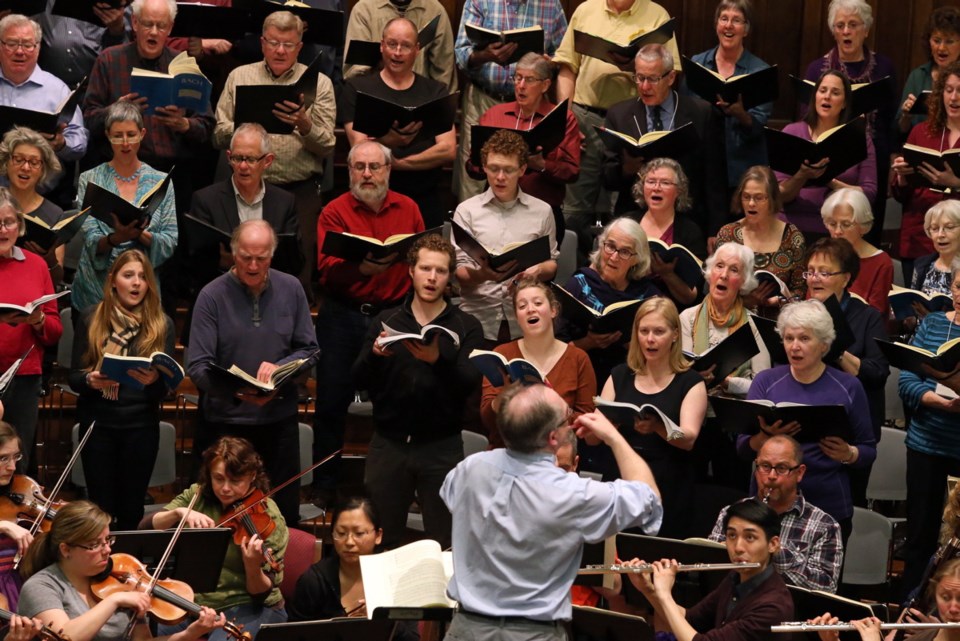What: Victoria Philharmonic Choir: Bach’s St. John Passion
When/where: Saturday, 7:30 p.m., First Metropolitan United Church (932 Balmoral Rd., at Quadra St.)
Tickets: $30, students $15. Online at vpchoir.ca; in person at Ivy’s Bookshop, Munro’s Books, the Shieling and Tanner’s Books
What: Vox Humana: The Little Match Girl Passion
When/where: Saturday, 7 p.m., Sylvan United Church (985 Shawnigan Mill Bay Rd., Mill Bay); Sunday, 3 p.m., St. Mary’s Church (1973 Cultra Ave., Saanichton); Monday, 3 p.m., Lutheran Church of the Cross (3787 Cedar Hill Rd.)
Tickets: By donation
Two Victoria choirs will celebrate Easter this weekend by performing major works connected to the Passion story. But they are very different choirs, and very different Passions.
The grander and more familiar of the two works, Bach’s St. John Passion, will be performed on Saturday by the 70-voice Victoria Philharmonic Choir, conducted by Peter Butterfield and supported by an orchestra numbering about two dozen, including several period-instrument specialists.
The performance will not be a conventional one, however: Butterfield is adding an element of staging to the proceedings.
Though not conceived as theatre, Bach’s Passions are undeniably dramatic, and staged and semi-staged productions of them are fairly common.
As early as 1943, the St. Matthew Passion was transformed into a “modern miracle play” at the Metropolitan Opera, through dance (choreographed by Balanchine), mime, costuming and lighting.
There have been other staged Matthew Passions over the years, most famously those directed by Jonathan Miller (London, 1993) and Peter Sellars (Salzburg and Berlin, 2010).
The St. John Passion is not staged as often, even though it is arguably the more inherently theatrical work — leaner, faster-moving, less meditative.
Productions of it have been directed by, among others, Deborah Warner (London, 2000) and Sellars (Berlin, 2014), and a semi-staged performance is scheduled to be given Friday afternoon in Brighton, England.
“Staging” is too strong a word for what Butterfield has planned for Saturday. Still, he is seeking to make his performance both more dynamic and more intimate than usual by breaking down the conventional barriers separating performers from listeners and so, in effect, bringing the audience into the performance.
There will be no grand entrances or formal bows at the beginning. The performers will all wear street clothes.
The Evangelist (tenor Benjamin Butterfield) will move around the audience area, and the five other vocal soloists will sing from various spots throughout the church. Pilate will address the crowd (i.e., the chorus) directly.
In other words, nothing so radical as Warner’s decision to bring a live lamb onstage at the end, but enough to recapture something of what a Passion setting represented for Bach’s own audiences: not a concert but a communal experience.
Also this weekend, the adventurous chamber choir Vox Humana, directed by Brian Wismath, will reprise its most extraordinary recent offering: The Little Match Girl Passion, by the American composer David Lang.
This highly original work, composed in 2007, is based on Hans Christian Andersen’s story, in which (as Lang bluntly summarizes it) “a poor young girl, whose father beats her, tries unsuccessfully to sell matches on the street, is ignored and freezes to death.”
Lang’s setting of this heart-rending fable runs a little over half an hour, and the music is spare, pristine, intimate — although also tricky to sing. Compelling and emotionally powerful, the work is all the more haunting because Lang tells Andersen’s tale in a reflective and dignified manner. Observing that Andersen drew a “religious and moral equivalency” between the Little Match Girl and Jesus, Lang conceived his setting as a sort of secular Passion, and drew on Bach’s St. Matthew Passion for inspiration.
The Little Match Girl Passion won a Pulitzer Prize and has been performed hundreds of times around the world; Vox Humana’s previous performance, in 2013, was the B.C. première.
On that occasion, it was performed in a version for choir, but this weekend, Vox Humana will offer it in its original form, with just four solo singers, who accompany themselves on various percussion instruments. (The two women are from Vox Humana, the two men from the Vancouver Chamber Choir, and all are “extraordinarily talented,” Wismath says.)
The program will open with Compassio, a “choral prelude” by the Vancouver-based composer David Archer that Vox Humana commissioned and premièred in 2013. Wismath describes it as “a short and joyful work that sets the stage nicely for the Little Match Girl.”
Vox Humana, incidentally, has been branching out geographically in recent years. The Lang program was performed in Vancouver on Sunday afternoon, and will be performed in three different places in the Victoria area this weekend.



